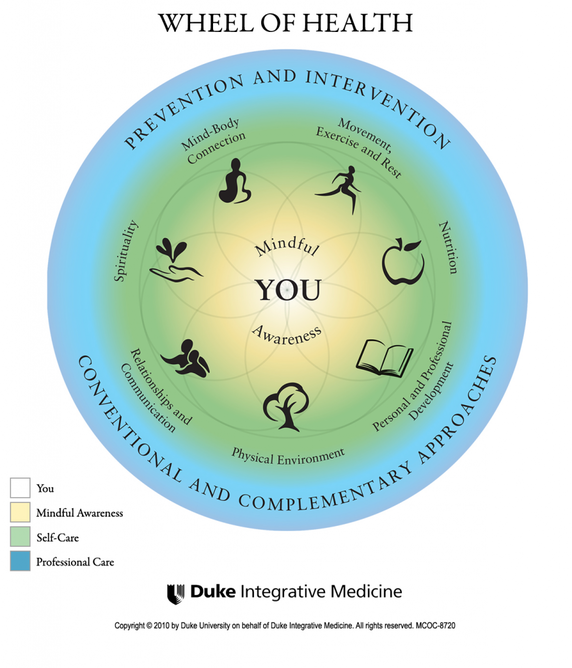Domains of the Duke Integrative Medicine Wheel of Health

Mind-Body Connection: Taking advantage of complex connections between state of mind and basic physiologic functions in the body, many mind-body skills can have a profound impact on your health. Breathing techniques, meditation, progressive muscle relaxation, guided imagery, and other therapies are used to activate the body’s automatic healing response and reduce the harmful effects of stress.
Movement, Exercise, and Rest: Exercise supports your health in maintaining weight, blood pressure, reducing lipids, releasing stress, and improving mood and focus. Developing a sustainable, appealing plan that meets your needs and keeps you strong, flexible, balanced, and happy is ideal. You must also balance physical activity with rest, healthy sleep, and restorative relaxation.
Nutrition: Attending to what you eat can boost your body’s natural healing potential. An integrative nutrition approach includes developing healthy eating habits, eating foods that support your health and fit your lifestyle, selecting dietary supplements that provide support for various issues in your health, and regulating substances you ingest that may impact health such as caffeine, alcohol, nicotine, etc.
Spirituality: Developing a deep understanding of the purpose and meaning in your life supports all aspects of physical and emotional health. Religion, prayer, and spiritual connections in traditional healing systems complement conventional medicine and offer positive effects on health and well-being.
Personal and Professional Development: An ongoing assessment of where you are with personal, career or life goals– especially important at times of transition, milestones, and tipping points in life—can reinforce healthy behavior and lifestyle choices. Taking a deeper look at work-life balance, financial goals, and personal growth supports optimal well-being.
Physical Environment: Evolving science suggests that your surroundings can influence your health in many ways. It is important to give some thought to how your environment can support your health: creating a nurturing space that facilitates relaxation, or a special place to build your mind-body practices; arranging workspaces and selecting furniture that supports your body; exploring options for dealing with concerns you may have about toxic exposure, safety, noise, clutter and other aspects of your environment.
Relationships and Communication: Building a supportive community and maintaining healthy connections with your family, co-workers, and friends is important to your life and your health. It is vital to identify the ways in which you need support, and to communicate them effectively to those around you.
Movement, Exercise, and Rest: Exercise supports your health in maintaining weight, blood pressure, reducing lipids, releasing stress, and improving mood and focus. Developing a sustainable, appealing plan that meets your needs and keeps you strong, flexible, balanced, and happy is ideal. You must also balance physical activity with rest, healthy sleep, and restorative relaxation.
Nutrition: Attending to what you eat can boost your body’s natural healing potential. An integrative nutrition approach includes developing healthy eating habits, eating foods that support your health and fit your lifestyle, selecting dietary supplements that provide support for various issues in your health, and regulating substances you ingest that may impact health such as caffeine, alcohol, nicotine, etc.
Spirituality: Developing a deep understanding of the purpose and meaning in your life supports all aspects of physical and emotional health. Religion, prayer, and spiritual connections in traditional healing systems complement conventional medicine and offer positive effects on health and well-being.
Personal and Professional Development: An ongoing assessment of where you are with personal, career or life goals– especially important at times of transition, milestones, and tipping points in life—can reinforce healthy behavior and lifestyle choices. Taking a deeper look at work-life balance, financial goals, and personal growth supports optimal well-being.
Physical Environment: Evolving science suggests that your surroundings can influence your health in many ways. It is important to give some thought to how your environment can support your health: creating a nurturing space that facilitates relaxation, or a special place to build your mind-body practices; arranging workspaces and selecting furniture that supports your body; exploring options for dealing with concerns you may have about toxic exposure, safety, noise, clutter and other aspects of your environment.
Relationships and Communication: Building a supportive community and maintaining healthy connections with your family, co-workers, and friends is important to your life and your health. It is vital to identify the ways in which you need support, and to communicate them effectively to those around you.
